This post may contain affiliate links. We may receive a small commission, at no cost to you, if you make a purchase. Read Disclosure.
One of the most exciting things to do in Bangkok is to check out the floating markets. There’s nowhere more authentic and charismatic than the winding canals where vendors yell from wooden, long-tail boats, selling their produce to those on land or in other boats.
The smell of incense and jasmine waft up my nostrils as soon as we enter the Khlong Lat Mayom Floating Market. It’s pretty and calming, much like the rest of the villages on this side of the canal.
The smell of roasting BBQ pork guides us deep into the riverside market, and the sounds of sizzling meat on the grill and the yells of locals bartering prices fill my ears.
Flags stretch across the canals, tied to the thatched roofs covering the markets. It’s the side of Bangkok that you’ve got to see.
But what is it like visiting the Khlong Lat Mayom and how do you get there? Here is everything you need to know!
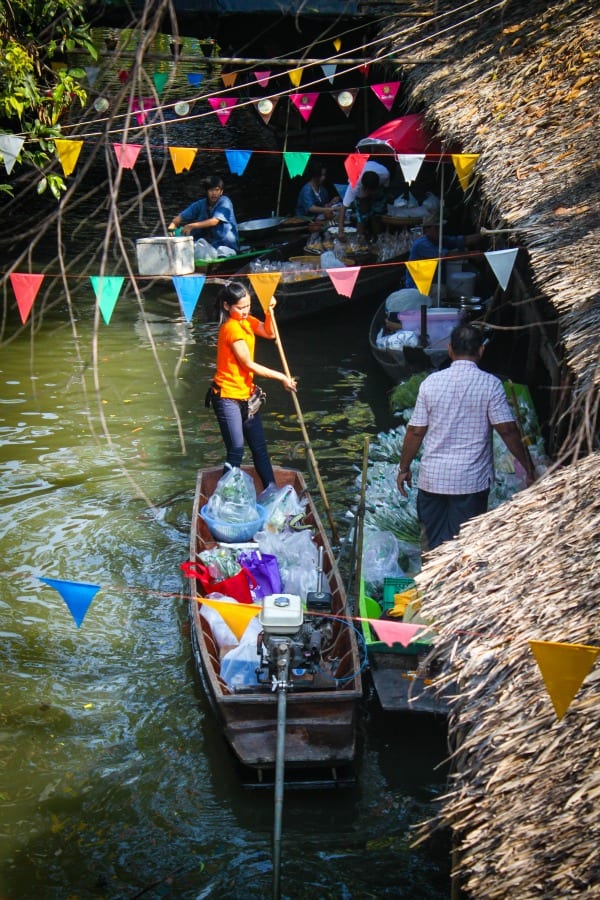
What is the most famous floating market in Bangkok?
If you ask any tour operator what is the most famous market, they will say Damnoen Saduak Floating Market or Amphawa Floating Market.
These markets are for only foreigners and are tailored towards western culture, but if you want the authenticity of a local market culture…ask the locals.
If you ask the locals which market they like the best, they will say probably say Khlong Lat Mayom.
What is a Floating Market?
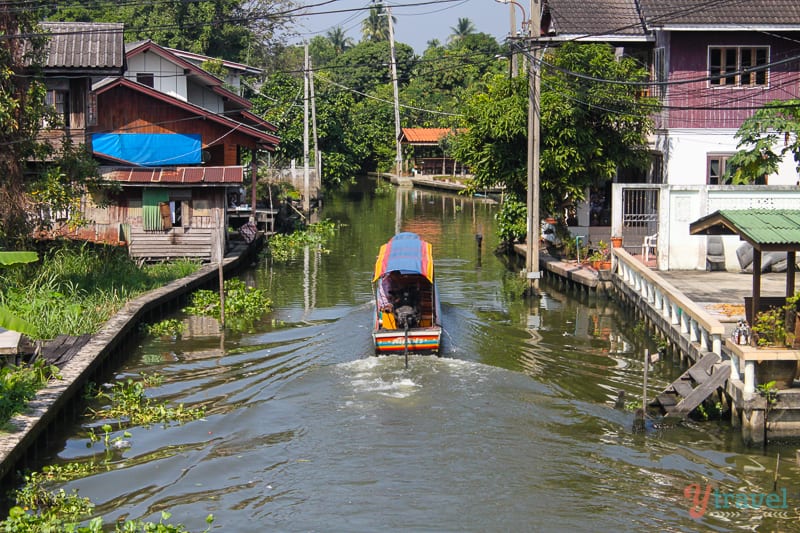
A floating market is exactly what it says on the tin, it’s a market that floats…well, on boats. In Bangkok, there are several winding canals that meander around the small neighborhoods outside the city center.
The canals were once the main form of transport in the city before bridges were made, and were how traders got from neighborhood to neighborhood selling their goods.
Not much has changed today. Locals still use the canals as a way to get around, and also to sell produce from their traditional long-tail wooden boats.
You can find people selling everything from ceramics to houseware goods to fresh fruits and vegetables to street food from the tiny wooden boats in Bangkok’s canals.
But these markets don’t just pop up anywhere. There are a few dedicated spots for vendors to sell their goods from their boats, otherwise known as floating markets.
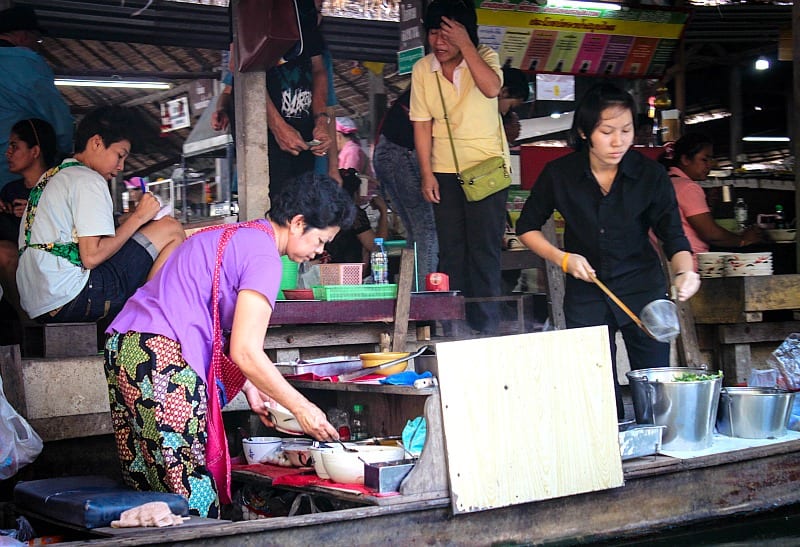
What It’s Like Visiting Khlong Lat Mayom
The floating markets are only about 30 minutes from Bangkok on the Thonburi side of the river. They are lesser known than the heavily touristed floating markets of Damnoen Saduak and Amphawa.
Whilst Damnoen and Amphawa are more energetic with traffic jams of long-tail boats, Khlong Lat Mayom is a narrow canal with a more authentic feel, with the majority of vendors and eating areas on land.
Our guide Tim shares with us a little about the Khlong Lat Mayom Floating markets. He describes these markets as a way of life for the local people.
“Not spoilt by tourists. No tourist goods or souvenirs. It’s a market made for the local people and Thai tourists.”
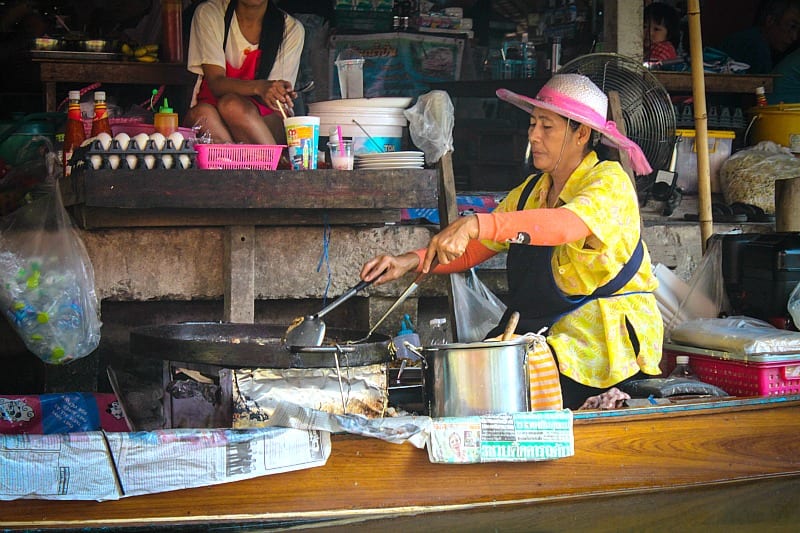
It’s also the sort of place travellers love – the authentic local markets that offer a glimpse into Thai daily life. I envisioned a few years down the track the invasion of the falangs (foreigners) once word began to spread.
The market is a fairly young market and is the joining of lots of small local markets in the nearby canal neighbourhoods, and the food is fantastic.
The biggest draw card to the markets is the food stalls. There is no Thai dish you cannot find here. The hardest decision is narrowing down your choice to one or two, or maybe five.
You can find everything from Noodle Soup to Pla Pao, a salt grilled fish delicacy that’s famous in the market. Some other popular dishes to try here are Hoi Tod (Oyster Omelet), Kanom Jeen (Cold Rice Vermicelli), and Gai Galae (Grilled Chicken).
Squashed in amongst the food and low tables lining the canals handicrafts, plants, and clothing stores too.
“Thai people love shopping. After we’re full, we look for beauty and things that give us enjoyment.” Tim chuckles as she steers us through the markets.
There’s no room in my suitcase for the things that give me enjoyment, but there’s certainly room in my stomach to get full.
Our Experience at Khlong Lat Mayom
We arrive early and we’re immediately thrust into an exotic experience. Luckily at this time, there’s plenty of space to move amongst the colourful stalls. The crowds thicken at Lat Mayom during lunchtime – peak hour.
We walk past a few stalls and I mentally pick out several dishes to come back and try. My grin widens and my tummy rumbles even louder at the prices of the meals, 20 baht for fish cakes, 30 baht for a curry, sticky rice – we certainly were in the locals market.
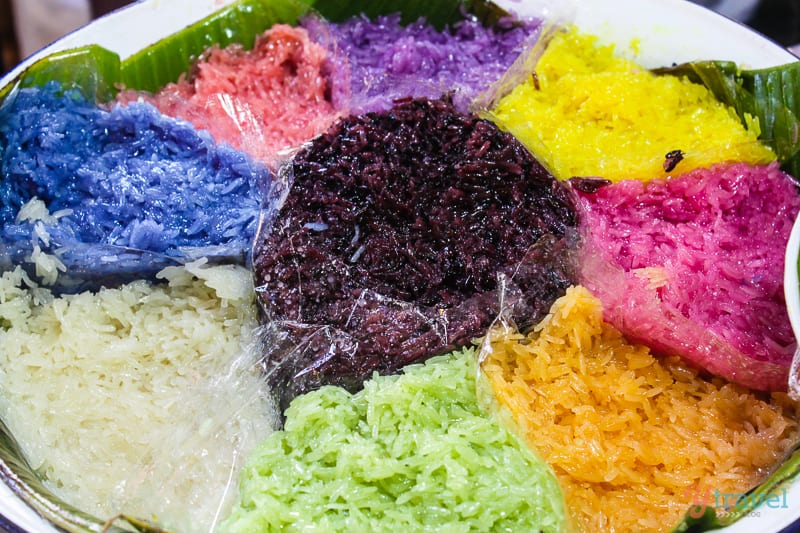
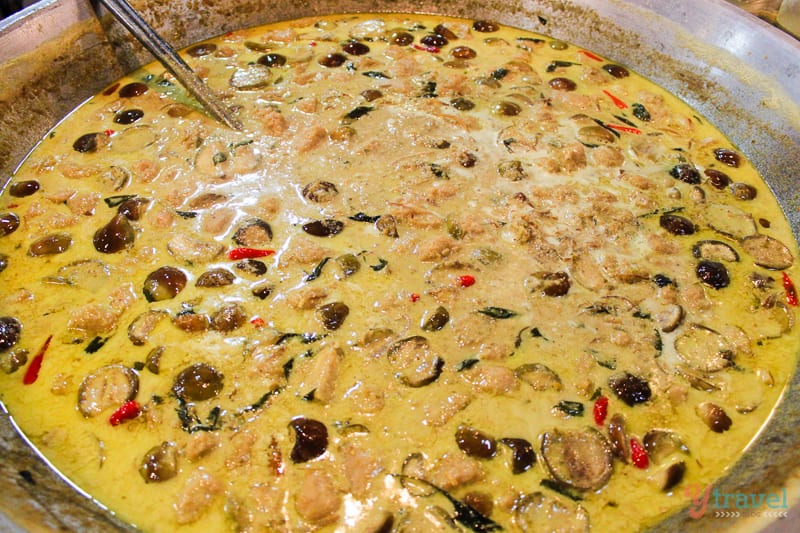
Tim takes us to the long tail boats waiting on the canal. We climb in and begin exploring the canals.
I grab a bag of Kanom Tarn from a long tail boat first. The moist sponge cake, topped with shredded coconut – one of my fave Thai desserts – is perfect for the gentle boat ride to the village. Not too sweet and is silky smooth.
Catfish jump out of the water beside the boat to try and get some.

We’re content as we putter through the back canals of suburbia Bangkok.
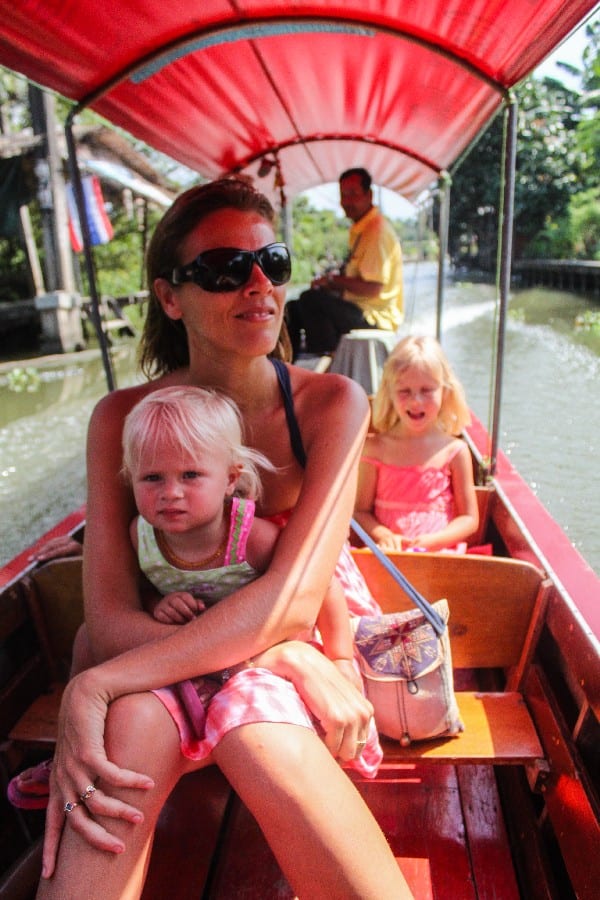
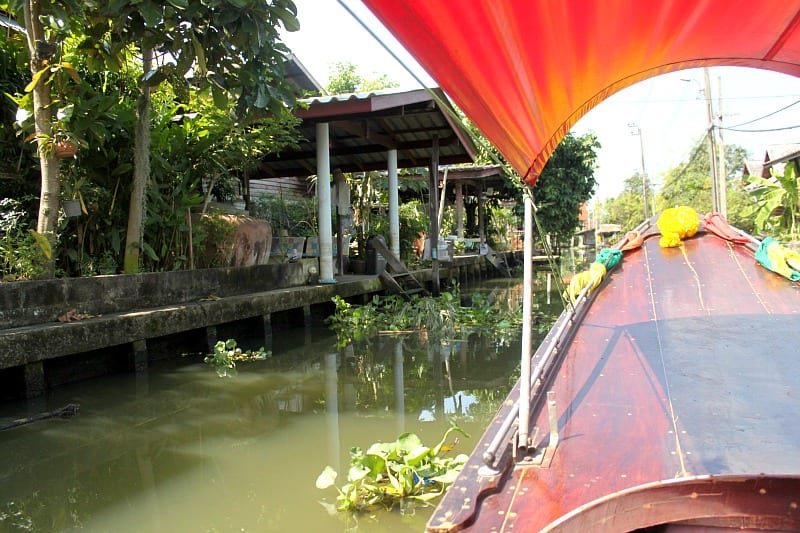
Many of the homes have large gardens on the edge of the canals, a place to sit in solitude – almost unheard of in Bangkok.
I took to it immediately.
We pull up at the dock, cross a low bridge, and walk along a footpath to the row of homes that open their doors to the odd passing tourist. Mangos, papayas and bananas dangle over our heads and we stop to point them to the girls.
“Oh look Mummy, the papaya’s your favourite and Savannah loves banana and I love mango!”
“Yes so very cool!”
We enter the first garden, there is a pretty red swing the girls sit on and play with the colourful balloons the owner of the house gave to them. They are happy. We walk around the gardens soaking in the serenity before moving to the next house.
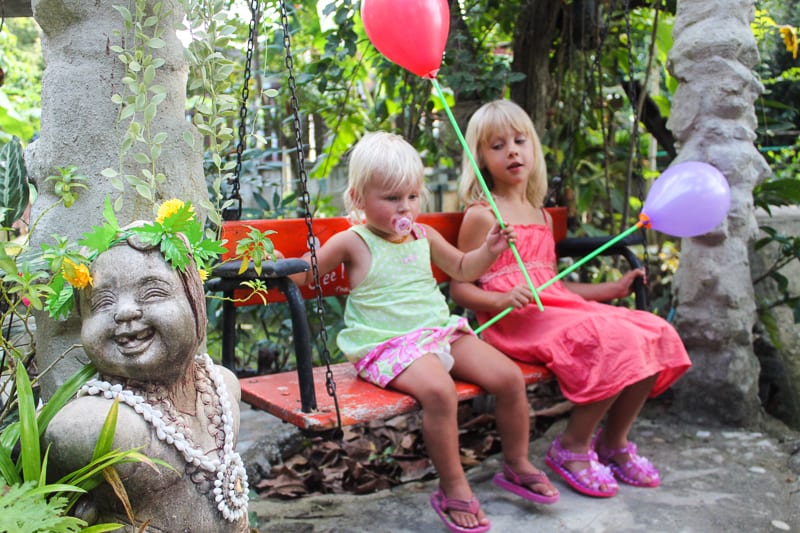
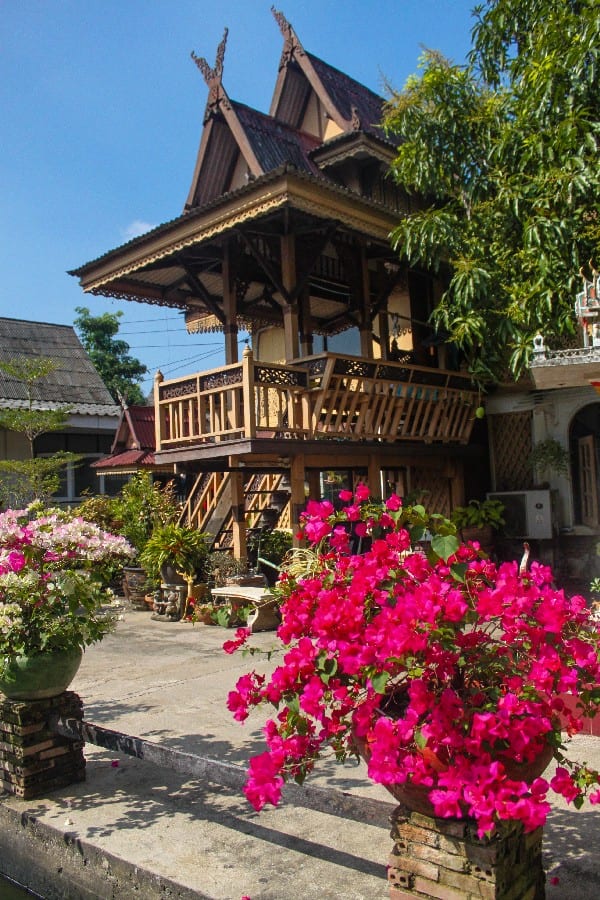
Grandma sits on a little wooden stool in the shade, a steel cauldron sits on a small cooking stove in front of her adding to the already stifling Bangkok heat.
Here by the canals, a slight breeze blows, but still the beads of sweat run down her face.
For 30 minutes she sits and patiently stirs, eyes on the green gooey pandan.
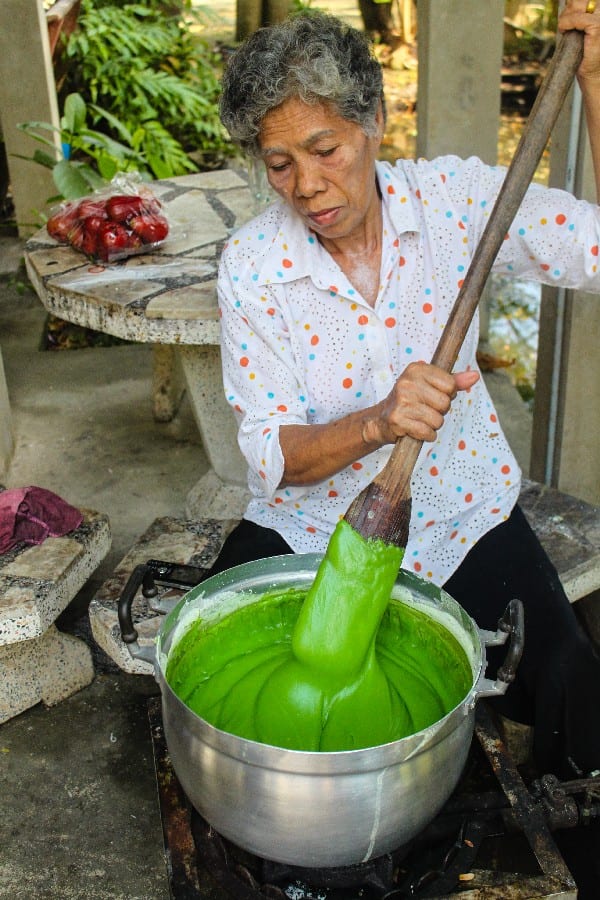
We become just as mesmerized as Tim describes how she will make the popular Thai dessert.
Once cooked, she’ll take the pandan, run it through a hand-operated machine which cuts it into worm-like noodles. And then she’ll pour coconut milk over the worms and top it with shaved ice. It doesn’t look too welcoming, but the sweet freshness is exactly what I need on yet another hot Bangers day.
A store set up in a room outside the house also sells variations of small sweets made from coconuts. At 10 baht a container, how could you say no to three different types?
Tim takes us to the end house, a guest house for those wanting a village stay. It’s a quirky wooden shack with unusual furnishings. Strange eclectic folk tunes play in the background as we wander upstairs to have a poke about.
I could picture myself spending a weekend here to escape the madness of Bangkok. The sun chair out the back beckoned me to sit with a glass of wine and a good book.
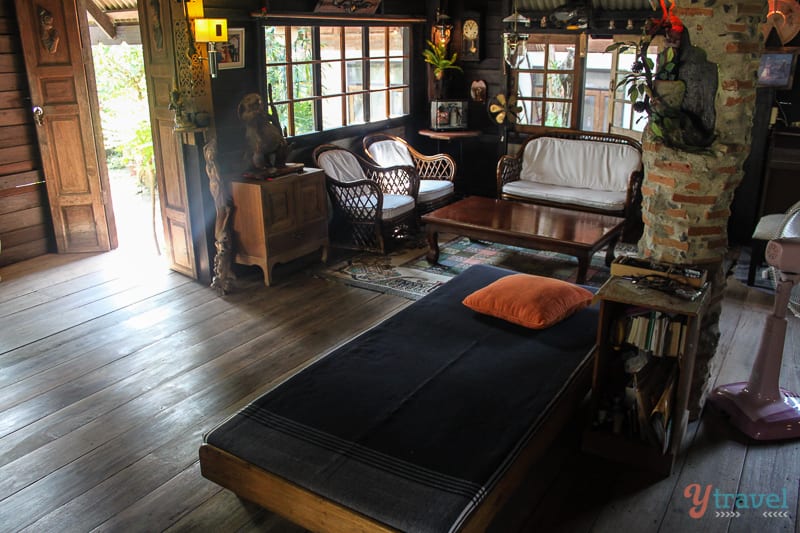
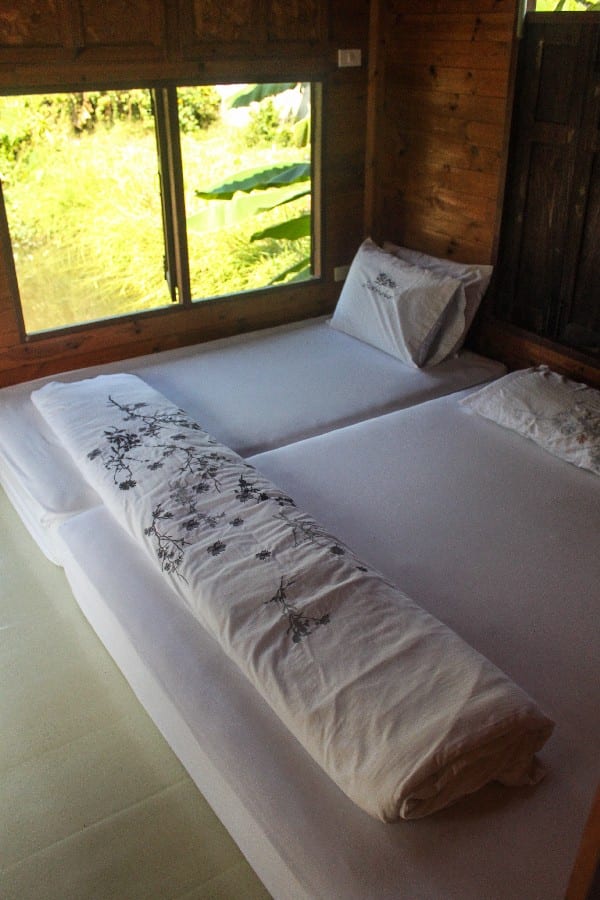
We walk along the footpath and around the corner to meet the boat.
A cyclist rings his bell and waves hello, a little further down an elderly man with a long Ho Chi Minh beard patiently chops washed up debris from the previous years flood to make charcoal, and we are soon tooted out of the way by the village postman on his motorbike.
Once again Bangkok is fascinating Kalyra as her young mind tries to grasp why the postie is riding around on footpaths.
Tucked away from the madness of inner city Bangkok, there is a peace and tranquility here usually only found in rural Thailand.
The trees, vines and vibrant flowers surround us and the air is fresh and clean.
We pick up a bag of fish cakes before boarding the boat back to where the real eating would begin.
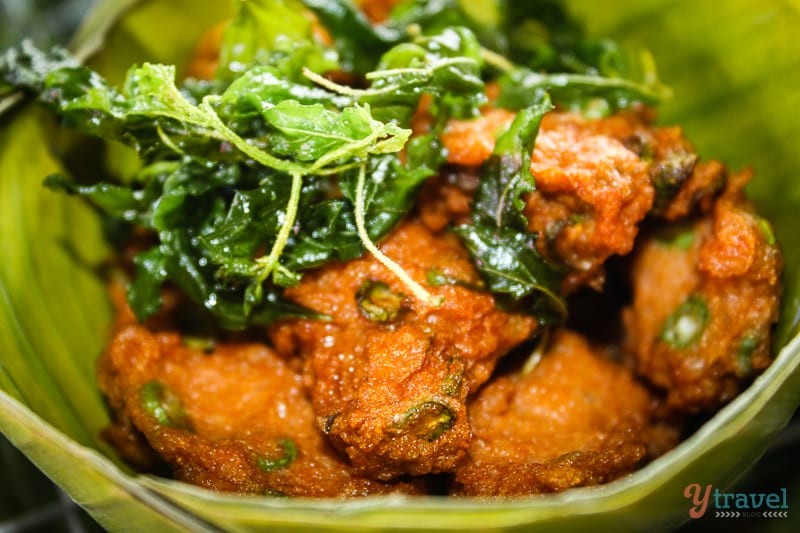
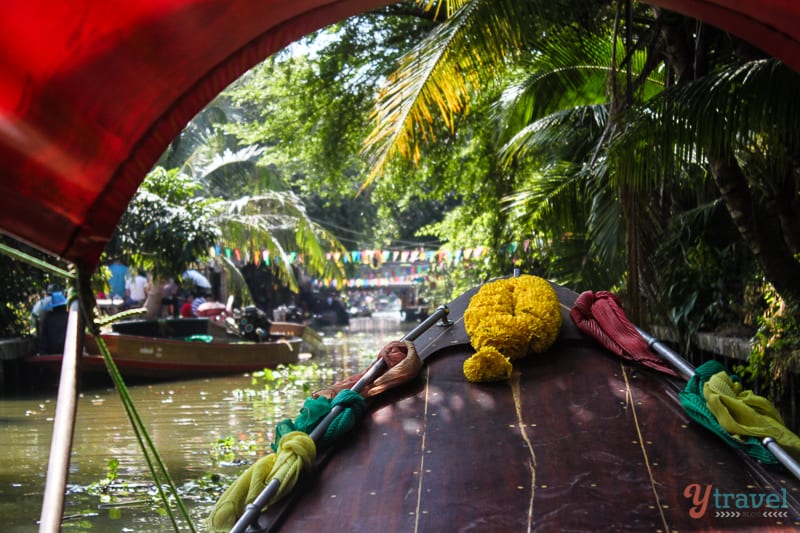
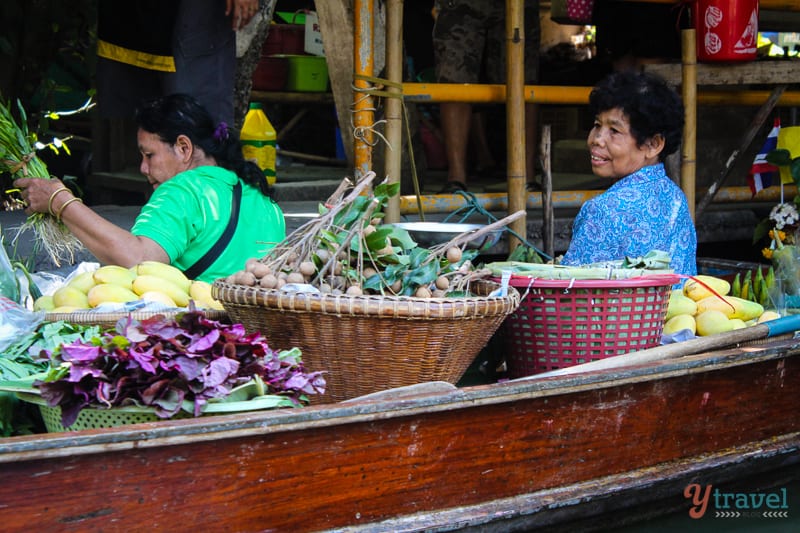
Rows and rows of Thai food stalls line the riverbank and by now it was getting difficult to move. We see only the odd falang (foreigner), their heads bowed down in worship to another bowl of cheap, authentic Thai noodle soups.
There’s seafood, fresh fruit, BBQ chicken, pork skewers, thai pancakes and much more.
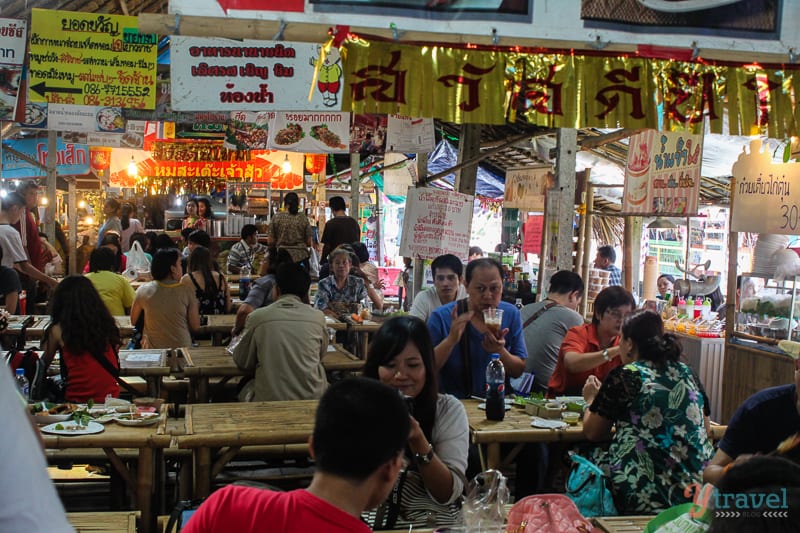
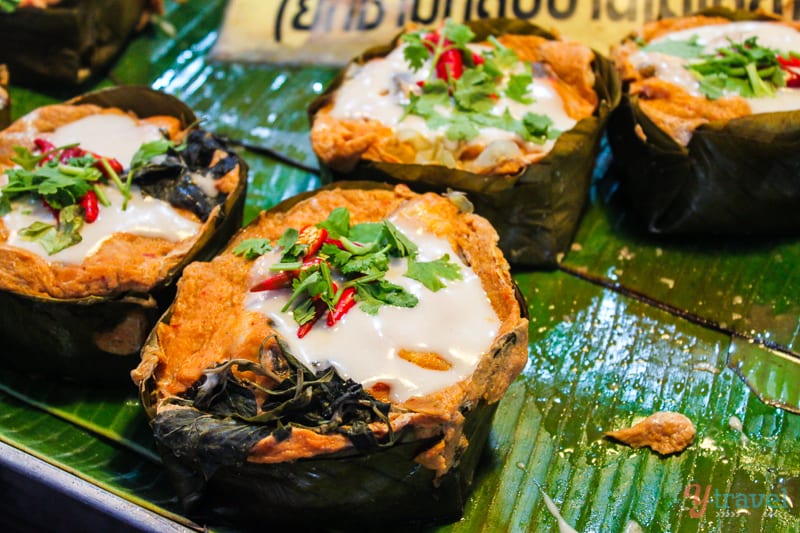
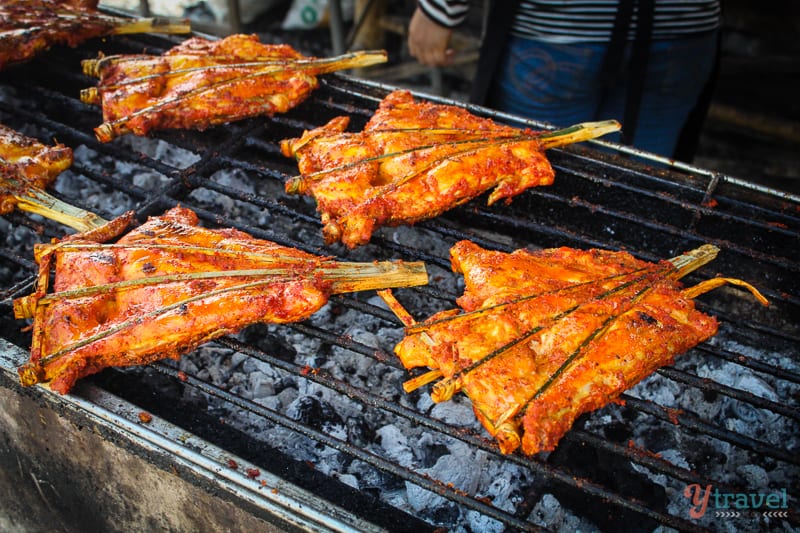
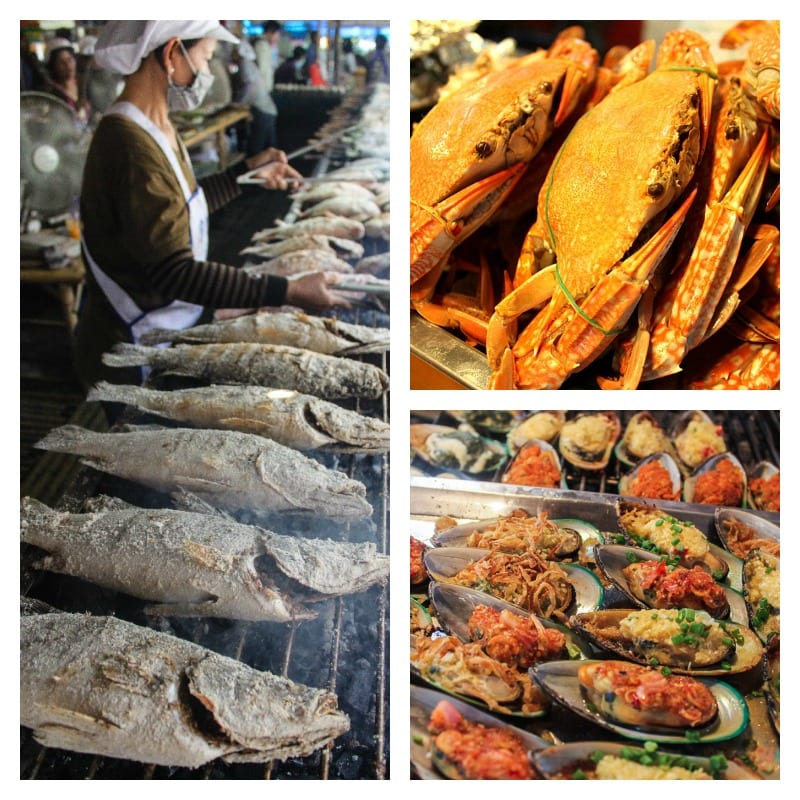
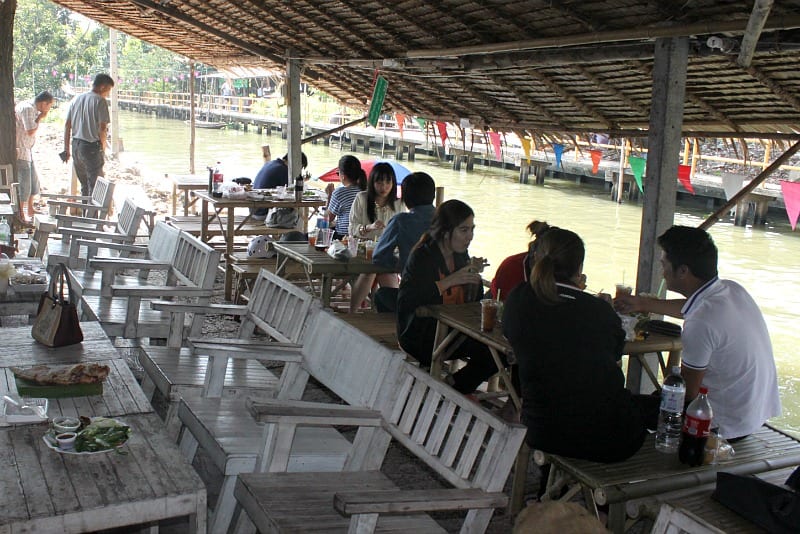
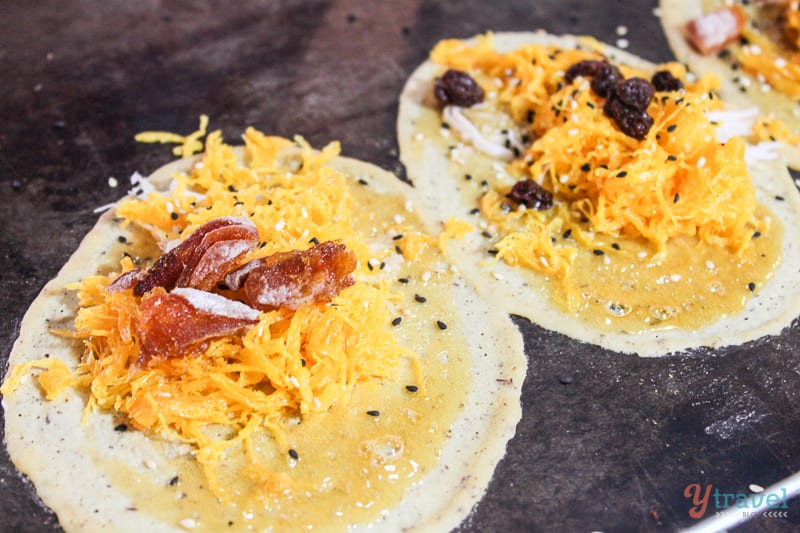
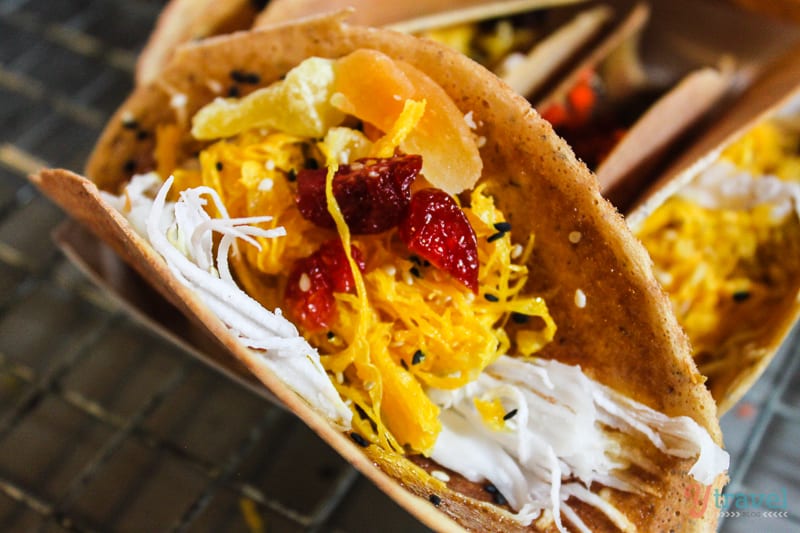
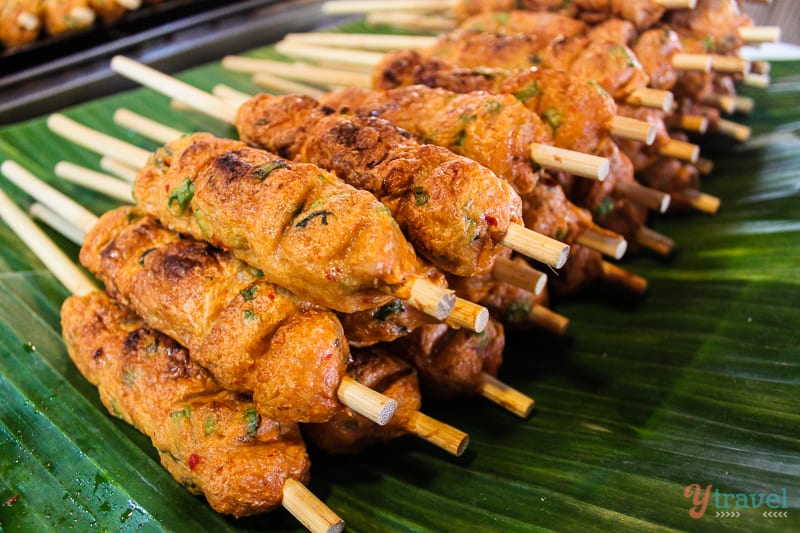
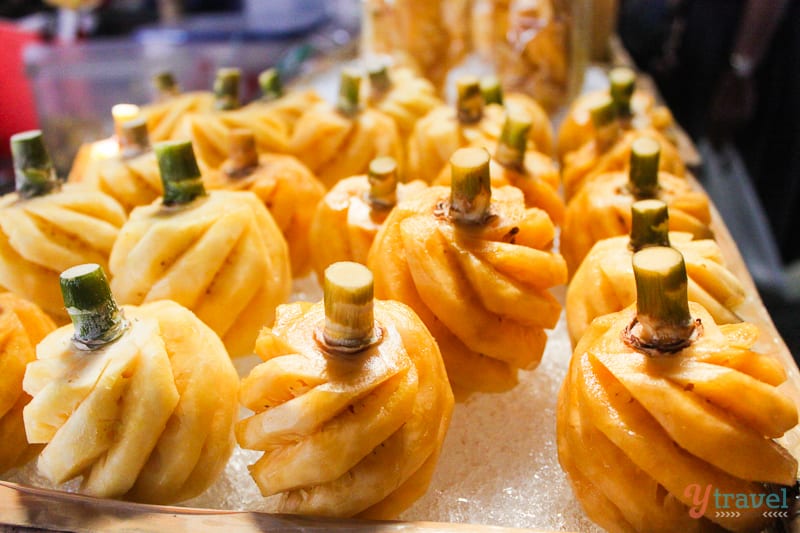
We could have spent all day eating, but with two small girls who hate crowds, our time was pretty limited. We didn’t have long before the meltdown would begin.
We watched as a lady stood rolling large balls of eggs and mixed seafood in a hot muffin tin. Tim told us they were omelettes. A little egg mixture was placed in the container, seafood filling was added, and the balls continually rolled around and around until they cooked.
They were delicious and hearty and a good lunch for little Savannah.
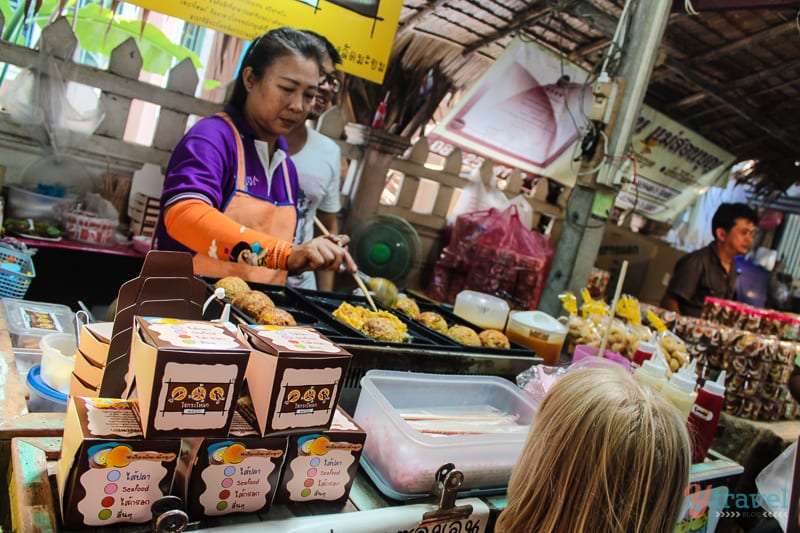
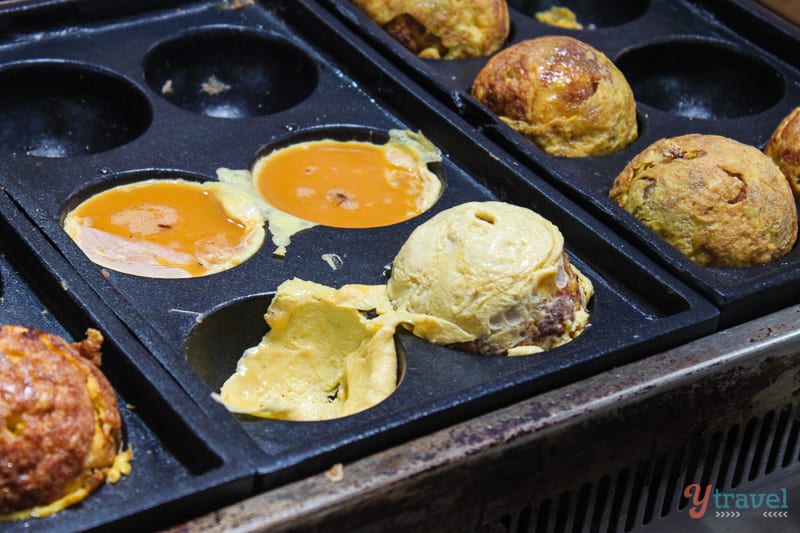
Kalyra settled for her favourite Pad Thai, brought from the boats cooking it on the canal. It came folded up on white paper, very typical of Thai street food. The taste was on par with it as well.
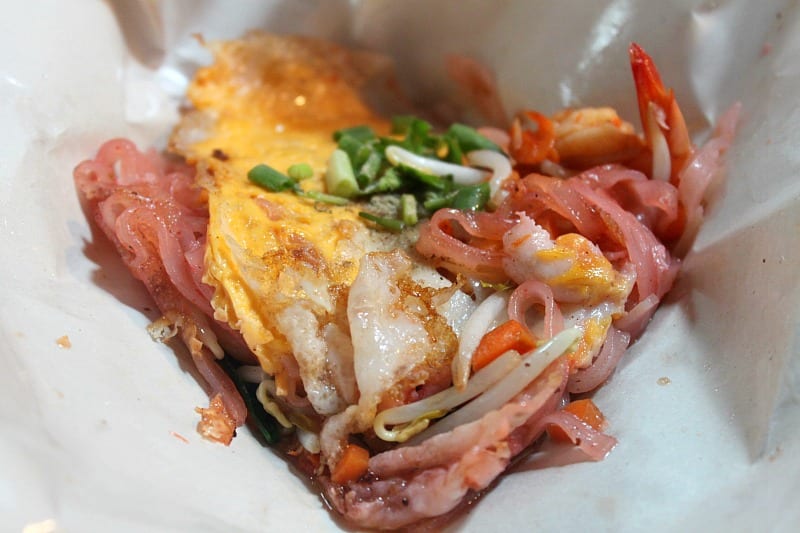
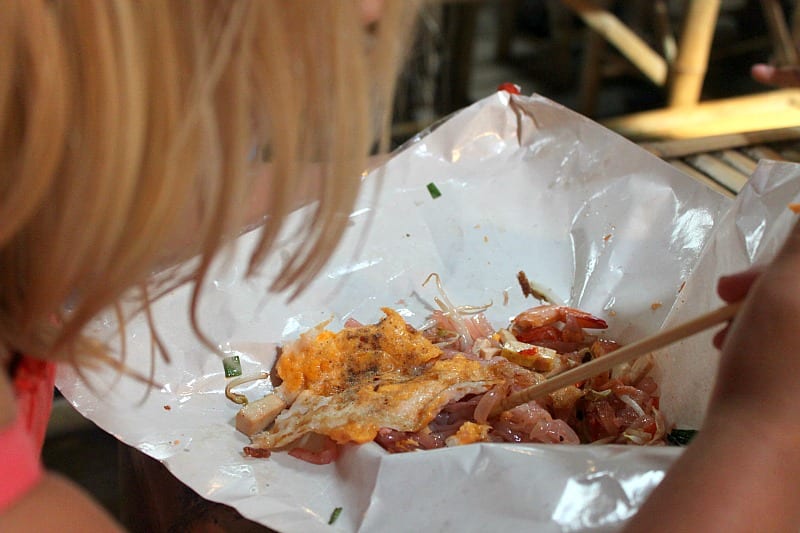
We leave with full bellies, but enough space to move to our next restaurant back in inner-city Bangkok. It’s a famous one for Thai people, and yes, in Thailand, there is always room for just one more authentic dish.
Khlong Lat Mayom Opening Hours
Khlong Lat Mayom is a weekend market on Saturdays and Sundays from 8:00 am to 5.00 pm. I would suggest arriving for opening time, as it gets pretty busy around lunchtime.
How to Get To Khlong Lat Mayom
The market is located on Bang Ramat Road, off the Bang Khae-Bang Bua Thong Outer Ring Highway.
The full address is: 30/1 Moo 15, Bang Ramat Road Khwaeng Bang Ramat, Khet Taling Chan, Bangkok 10170.
Using the metro, head to the Fai Chai metro station and from there get a taxi for a 10-minute journey. Or, you can take the BTS Skytrain to Bang Wa Station (end of the Silom line) and ride a taxi the rest of the way.
There is no BTS or metro directly to Bang Ramat Rd, so you will need to take a taxi whichever way you choose.
Before You Go
So there you have it, this is everything you need to know about visiting the Khlong Lat Mayom floating market. For us, the highlight of a floating market visit is the food and the authentic charm.
You can clearly see that the locals embrace their deep roots and traditions in keeping these markets alive and running. Before you go, remember you’re visiting the Khlong Lat Mayom which is not a tourist floating market, but a way of life for those buying and selling here.
So be respectful when taking photos.
Make sure you visit early to avoid the crowds and remember to carry cash with you, as many of the vendors don’t accept credit cards.
More Travel Tips for Bangkok
Are you looking for more inspiration about Bangkok? Then you might enjoy these resources!
Video: Khlong Lat Mayom Floating Markets
Want to see what the floating market is like? Here’s our video of the Khlong Lat Mayom floating market:
Have you visited one of the Bangkok Floating Markets? Share your tips in the comments.